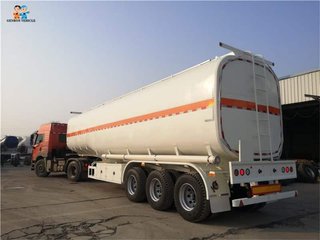Learn About Fuel Trailers: A Comprehensive Guide
Fuel Transportation Solutions are an essential tool for businesses and individuals who need to hold fuel efficiently and safely. Whether for agricultural, construction, or commercial use, fuel trailers provide a mobile and convenient solution for refueling vehicles and equipment on-site. In this guide, we'll explore the key features, benefits, types, and considerations when deciding on a fuel trailer.  Key Features of Fuel Trailers Tank Capacity: Fuel trailers are available in various sizes, which range from small portable units to large-capacity tanks that will hold a large number of gallons. Material Construction: Most fuel trailers are constructed of heavy-duty steel or aluminum to ensure durability and resistance to corrosion. Pumping System: A reliable pump and dispensing system make refueling quick and efficient. Electric, manual, or gas-powered pumps are normal options. Safety Features: Fuel trailers include safety measures including pressure relief valves, grounding cables, and spill containment features to avoid accidents. Trailer Design: Many models include heavy-duty tires, suspension systems, and braking mechanisms to be sure safe transport over different terrains. Benefits of Using Fuel Trailers Convenience: Fuel trailers eliminate the need for frequent trips to refueling stations by giving on-site fuel access. Cost Savings: Buying fuel large quantities can reduce costs, and utilizing a trailer prevents downtime due to fuel shortages. Versatility: Fuel trailers can hold various types of fuel, including diesel, gasoline, and aviation fuel. Increased Efficiency: Businesses will keep operations working efficiently by having a dedicated fuel supply offered by all times. Types of Fuel Trailers Single-Axle Fuel Trailers: Ideal for small-scale applications and light-duty transport needs. Tandem-Axle Fuel Trailers: Suitable for heavier loads and long-distance transportation. DOT-Approved Fuel Trailers: Designed to meet Department of Transportation (DOT) regulations for public road transport. Custom Fuel Trailers: Some manufacturers offer customized solutions according to specific industry requirements. Considerations When Choosing a Fuel Trailer Intended Use: Determine if you want a trailer for farm use, fleet management, or industrial applications. Capacity Needs: Select a tank size fitting your operational demands. Regulatory Compliance: Ensure that the trailer meets local and federal safety standards. Pump and Hose System: Consider the required pump flow rate and hose length for efficient fueling. Budget and Maintenance: Factor in the cost of purchase, maintenance, and then for any necessary permits. Fuel trailers are a great asset for industries that depend on a steady fuel supply. By understanding their features, benefits, and available choices, businesses may make informed decisions when investing in a fuel trailer. Proper maintenance and adherence to safety regulations make sure the longevity and longevity of the equipment, making fuel trailers a practical solution for mobile refueling needs.
Key Features of Fuel Trailers Tank Capacity: Fuel trailers are available in various sizes, which range from small portable units to large-capacity tanks that will hold a large number of gallons. Material Construction: Most fuel trailers are constructed of heavy-duty steel or aluminum to ensure durability and resistance to corrosion. Pumping System: A reliable pump and dispensing system make refueling quick and efficient. Electric, manual, or gas-powered pumps are normal options. Safety Features: Fuel trailers include safety measures including pressure relief valves, grounding cables, and spill containment features to avoid accidents. Trailer Design: Many models include heavy-duty tires, suspension systems, and braking mechanisms to be sure safe transport over different terrains. Benefits of Using Fuel Trailers Convenience: Fuel trailers eliminate the need for frequent trips to refueling stations by giving on-site fuel access. Cost Savings: Buying fuel large quantities can reduce costs, and utilizing a trailer prevents downtime due to fuel shortages. Versatility: Fuel trailers can hold various types of fuel, including diesel, gasoline, and aviation fuel. Increased Efficiency: Businesses will keep operations working efficiently by having a dedicated fuel supply offered by all times. Types of Fuel Trailers Single-Axle Fuel Trailers: Ideal for small-scale applications and light-duty transport needs. Tandem-Axle Fuel Trailers: Suitable for heavier loads and long-distance transportation. DOT-Approved Fuel Trailers: Designed to meet Department of Transportation (DOT) regulations for public road transport. Custom Fuel Trailers: Some manufacturers offer customized solutions according to specific industry requirements. Considerations When Choosing a Fuel Trailer Intended Use: Determine if you want a trailer for farm use, fleet management, or industrial applications. Capacity Needs: Select a tank size fitting your operational demands. Regulatory Compliance: Ensure that the trailer meets local and federal safety standards. Pump and Hose System: Consider the required pump flow rate and hose length for efficient fueling. Budget and Maintenance: Factor in the cost of purchase, maintenance, and then for any necessary permits. Fuel trailers are a great asset for industries that depend on a steady fuel supply. By understanding their features, benefits, and available choices, businesses may make informed decisions when investing in a fuel trailer. Proper maintenance and adherence to safety regulations make sure the longevity and longevity of the equipment, making fuel trailers a practical solution for mobile refueling needs.